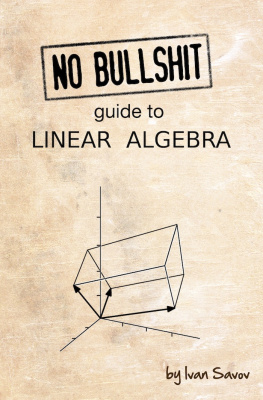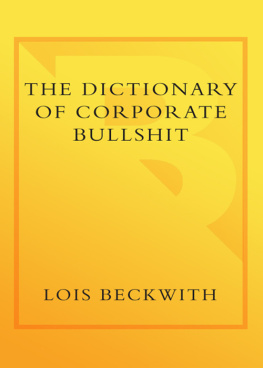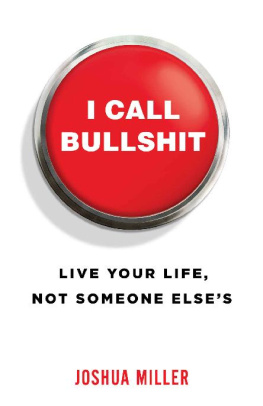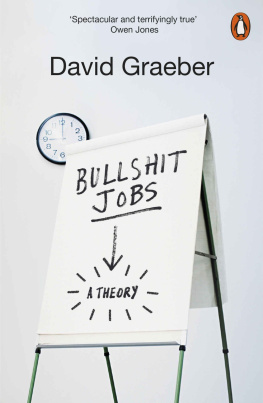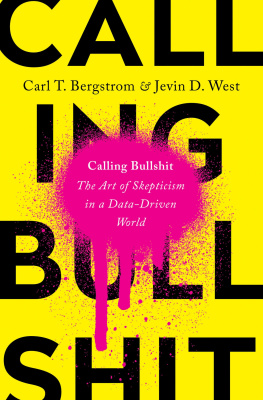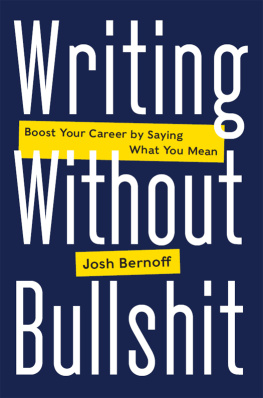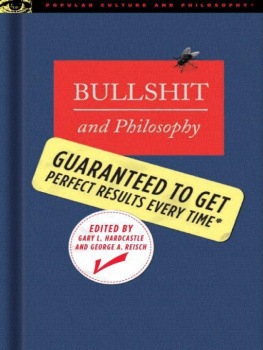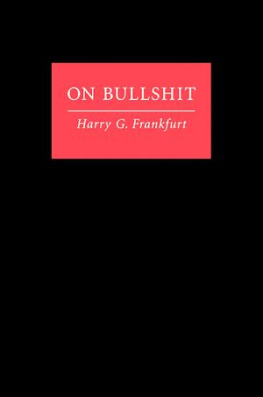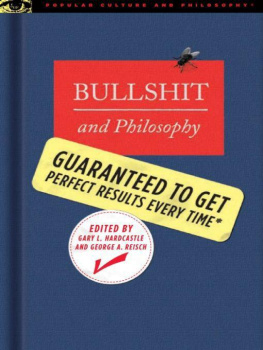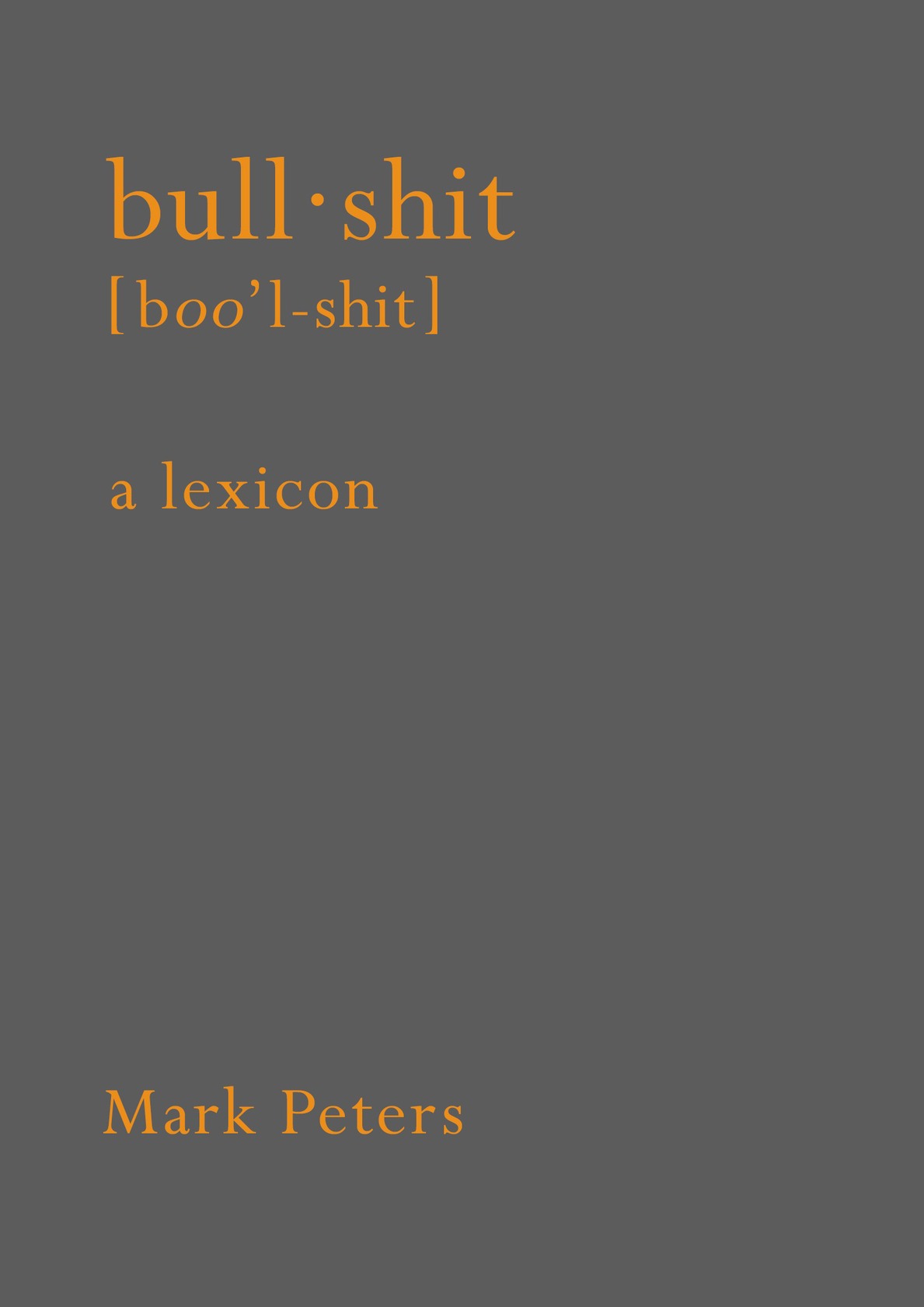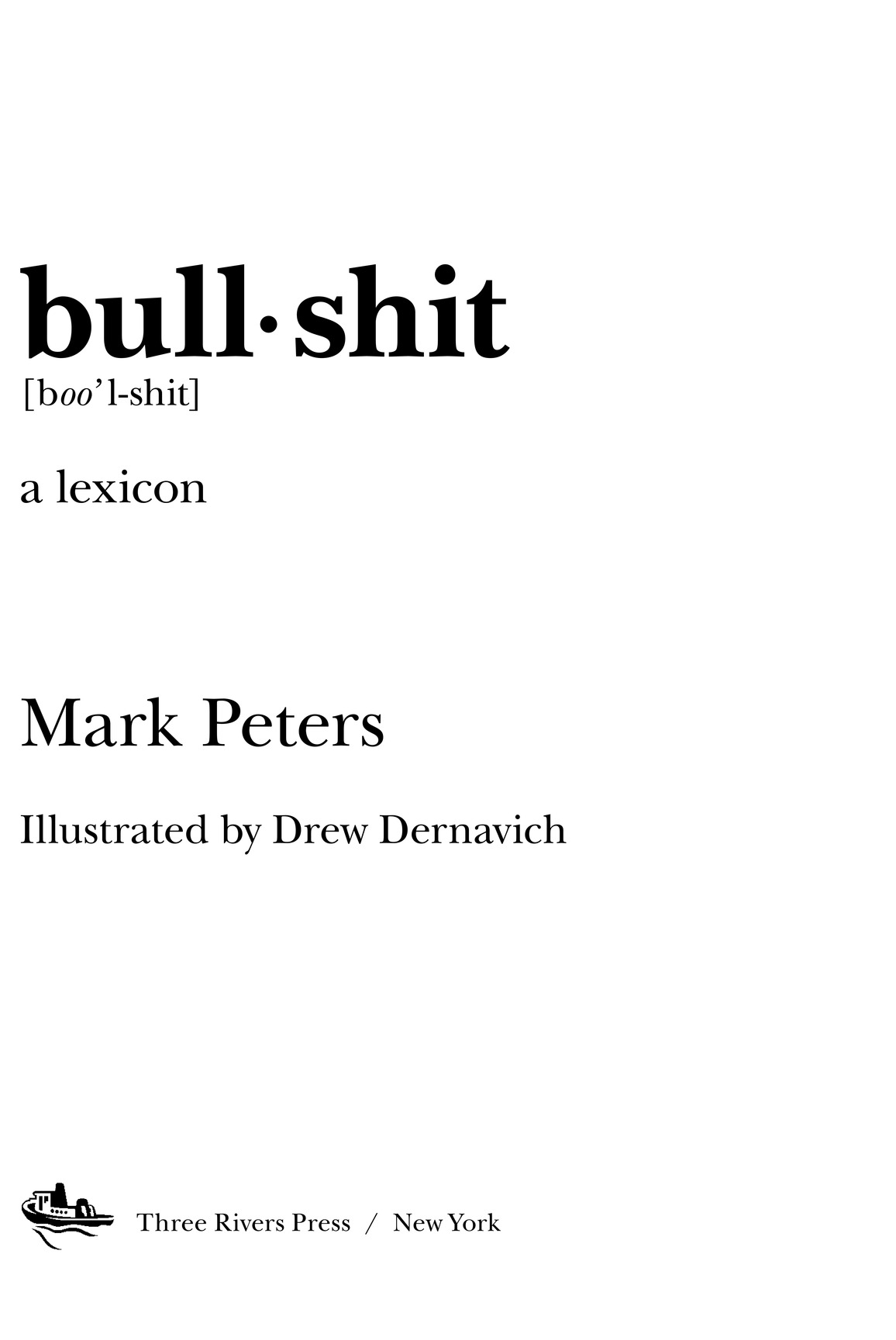All rights reserved.
Published in the United States by Three Rivers Press, an imprint of the Crown Publishing Group, a division of Penguin Random House LLC, New York.
Three Rivers Press and the Tugboat design are registered trademarks of Penguin Random House LLC.
Peters, Mark, 1972 Bullshit : a lexicon / Mark Peters. 1. Truthfulness and falsehoodHumor. 2. NonsenseHumor. 3. English languageUnited StatesJargonHumor. I. Title. PN6231.T74P48 2015 427dc23 2015014976
Bullshit is everywhere.
Introduction
Like you, I hate bullshit. But I kind of love it tooat least the words for it.
Malarkey! Bunk! Mule fritters! Flubdub! Selling wolf tickets! All my eye and Betty Martin!
Who wouldnt love words like that? The lingo of bullshit is earthy, silly, bonkers, and fun. And (at the risk of mansplaining) its a lot bigger than you think.
Ive been writing about words for over ten years and in dozens of publications. I write about euphemisms, new words, slang, etc. But while writing about lexical this and linguistic that, I kept getting drawn to words for bullshit.
At first I didnt know the BS vocabulary went beyond well-known words such as mumbo jumbo, balderdash, tommyrot, rubbish, and crapola. But then I would stumble upon a word like skimble-skamble: a rare term used by Shakespeare that can mean bullshit. Id notice that flummery has wild variations like flummadiddle. Id learn a great idiom like the British all gas and gaiters. Sometimes a BS word would enter my life more dramatically: I was lucky enough to be at the American Dialect Society meeting that voted truthiness 2005s Word of the Year. Word by word, I noticed there were far more terms for bullshit than I had ever imagined. My own searches in the Oxford English Dictionaryand the generous assistance of dictionary editors such as Jonathon Green (Greens Dictionary of Slang) and Joan Hall (Dictionary of American Regional English)confirmed it. BS is all over the English language, like horse apples on a country road.
This book explores that lexicon, giving a tour of more than two hundred words and phraseswell-known and obscure, filthy and euphemisticthat mean bullshit (or something with a very strong whiff of it). Along the way, youll also find a few words for bullshitters and bullshitting.
So what is bullshit? In his great essay On Bullshit, Harry Frankfurt distinguishes BS from lies. As Frankfurt explains, The bullshitter is faking things. But this does not mean that he necessarily gets them wrong. For Frankfurt, lies and bullshit exist in parallel universes, independent of each other. The bullshitter is more of a poser than a liar.
But language is slippery, and we use the word bullshit for many things. There is a bullshit spectrum, which includes the following, in order of decreasing complexity:
scams
lies
gossip
empty boasts
sentimental crap
insignificant things
rubbish
gibberish
Words that apply to a specific type of bullshit tend to eventually get applied to other forms too. For example, mumbo jumbo was originally superstitious nonsense, but the word can now be used for virtually any type of bullshit. Trumpery still tends to be used most often for the insignificant type of bullshit, but its sometimes used more broadly. Treacle refers to sentimental, phony bullshit, and its stayed close to that meaning. Each BS word has its own range of meaning, but theyre all linkedwith bullshit at the center.
Just as certain types of soil are more conducive to farming and certain bars are more conducive to brawling, there are a few subject areas and word types that tend to produce bullshit words.
Animals
The barnyard has been very good to the bullshit lexicon. Of course, theres bullshit itself and all related words. Then there are the various horse terms: horseshit, horsefeathers, horse apples, horse hockey, horsepucky, etc. Words like batshitwhich can mean bullshit or insanityalso live in the bullshit zoo.
Food and Drink
The bullshit lexicon is not limited to one end of the digestive journey: eating and drinking are also well represented. Such words include balderdash and balductum, which originally referred to drinks with a disgusting assortment of ingredients. This is the kind of bullshit you definitely dont want to swallow. Many BS terms have a similar make you sick origin. Other foodssuch as fudge, rhubarb, and spinacharent as inedible but still ended up on the lexical shelf next to twaddle and rot.
Air
On a less solid and disgusting note, the very air we breathe is often associated with bullshit: specifically the hot air we expel when giving guff (originally a puff of wind). This idea animates words such as airy-fairy and bloviator. If an idea is as insubstantial as air, its probably bullshit.
Politics
This prolific category includes bunk, which evolved from bunkum and the expression speaking for Buncombe, which involves politically motivated pandering. Terms such as spin, George Orwells newspeak, and Stephen Colberts truthiness are also mainly political.
Scams
Words such as shenanigan, gammon, and flimflam refer to the type of bullshit that involves hornswoggling people out of their money in some way. These words originally had to do with sweet deals involving something like bridges or snake oil. Today this type of bullshit is associated with fake Nigerian princes or Ponzi schemes.
Science Fiction
Science fiction often produces euphemisms and pseudo-obscenities, and that includes words for bullshit. Examples include targ manure from Star Trek, felgercarb from the original Battlestar Galactica, and crapspackle from Futurama.
There are also a few types of words that act as lightning rods for bullshit.
Reduplication
Reduplication is the process that creates words such as dillydally, hocus-pocus, and night-night, which represent the three most common types. You can repeat the word, changing only the vowel, as in twittle-twattle. You can change the initial consonant but keep the rest of the word, as in helter-skelter. Or you can repeat the whole word, as in choo-choo. Maybe because of the nonsensical sound, reduplication has been a bottomless well of BS words, including mumbo jumbo, arkymalarkey, fiddle-faddle, jibber-jabber, yakety-yak,


